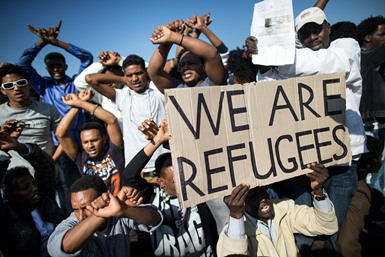Israel begins deporting Sudanese, Eritrean asylum seekers: reports
February 25, 2014 (KAMPALA) – Israel has begun deporting African asylum seekers from Sudan and Eritrea to Uganda, according to reports by an Israeli news outlet.

The state does not forcefully deport citizens of Eritrea due to the danger they face in their repressive home country known as the North Korea of Africa, and in the absence of diplomatic relations with Sudan the country is also unable to facilitate deportations of Sudanese nationals there.
However, the government has upped its monetary incentive to Africans to leave under its “voluntary departure” scheme from $1,500 to $3,500.
Eritreans Sudanese are among the largest migrant group, accounting for 80% of the 53,646 asylum seekers from Africa in Israel.
Last June, it emerged Israel’s High Court of Justice had reached an arrangement with an unnamed third country that would agree to accept asylum seekers from Africa.
At the time, the state refused to discuss the arrangement, while the Ugandan government denied the existence of such an agreement.
The UK’s Guardian newspaper said Uganda agreed to the deal in exchange for agricultural technology and arms.
HUMAN RIGHTS CONCERNS
Israel has been reluctant to grant asylum-seekers legal standing within its borders amid fears it would spark a fresh exodus of migrants. The government continues to exert strong pressure on migrants to leave voluntarily by either stalling their claims or keeping them in indefinite detention.
Human rights and advocacy groups say Israel’s actions represent a clear violation of international refugee conventions.
The director of the Hotline for Refugees and Migrants, Reut Michaeli, told Haartz last week that as far as her organisation is aware, asylum seekers sent to Uganda will not receive legal status or be issued with documents allowing them to leave if they want to.
However, ongoing uncertainty about their future and the hard conditions at Saharonim and the Holot detention facility, where many asylum seekers are incarcerated means many are electing to leave.
According to government figures, 2,612 migrants from Africa left Israel in 2013 as part of its voluntary departure process. Of those, 1,955 were from Eritrea and Sudan.
MASS PROTESTS
There is growing disquiet among asylum seekers themselves in Israel. Earlier this year, hundreds of asylum seekers began a protest march from the Holot detention centre in the desert to Tel Aviv, calling for the release of all the detainees and asking that their asylum applications be processed.
That was followed by a mass rallies in Tel Aviv, in which tens of thousands of African asylum seekers went on strike in protest against Israel’s migration policies, causing widespread disruption to businesses.
In a rare public statement issued during the protests, the UN refugee agency (UNHCR) criticised Israel’s policy on African migrants, calling on the government to seek alternatives to its current system of “warehousing” asylum seekers in detention facilities.
The agency also singled out the partial, temporary protection orders granted to asylum seekers from Sudan and Eritrea for particular criticism, saying the refugee recognition rates of nationals from both countries stood at 70% in other countries.
Israel has granted refugee status to just over 200 applicants since the country was founded in 1948. From 2009 and 2012, when the government took over the assessment of asylum claims from the UN, only 20 claims were approved from the 10,800 submitted. In 2013, Israel examined just 250 out of 1,800 asylum requests and approved none, according to Haaretz.
Meanwhile, Israel’s interior ministry announced in January that dozens of asylum-seekers, mainly from Sudan and Eritrea, had been voluntarily transferred to Sweden, although it later emerged the arrangement was in fact struck following a special request by the UNHCR.
NO REFUGE
Over the years thousands of African migrants have arrived in Israel on foot after fleeing persecution and oppression in their homeland. Many Eritrean asylum seekers are victims of rape and torture and have survived harrowing ordeals having been trafficked from Sudan to Egypt before escaping to Israel across the Sinai desert.
However, the influx of African migrants has sparked tensions in Israel, with locals blaming them for rising crime levels and altering the Jewish identity of some areas.
A five-metre-high fence constructed by Israel to curb the flow of African migrants was completed in December and has reduced the number of people crossing illegally from 10,000 in 2012 to fewer than 45 last year.
There are reports that the Israeli Defence Forces (IDF) cross into the Sinai to deteralso potential asylum seekers before they even reach the border.
(ST)
